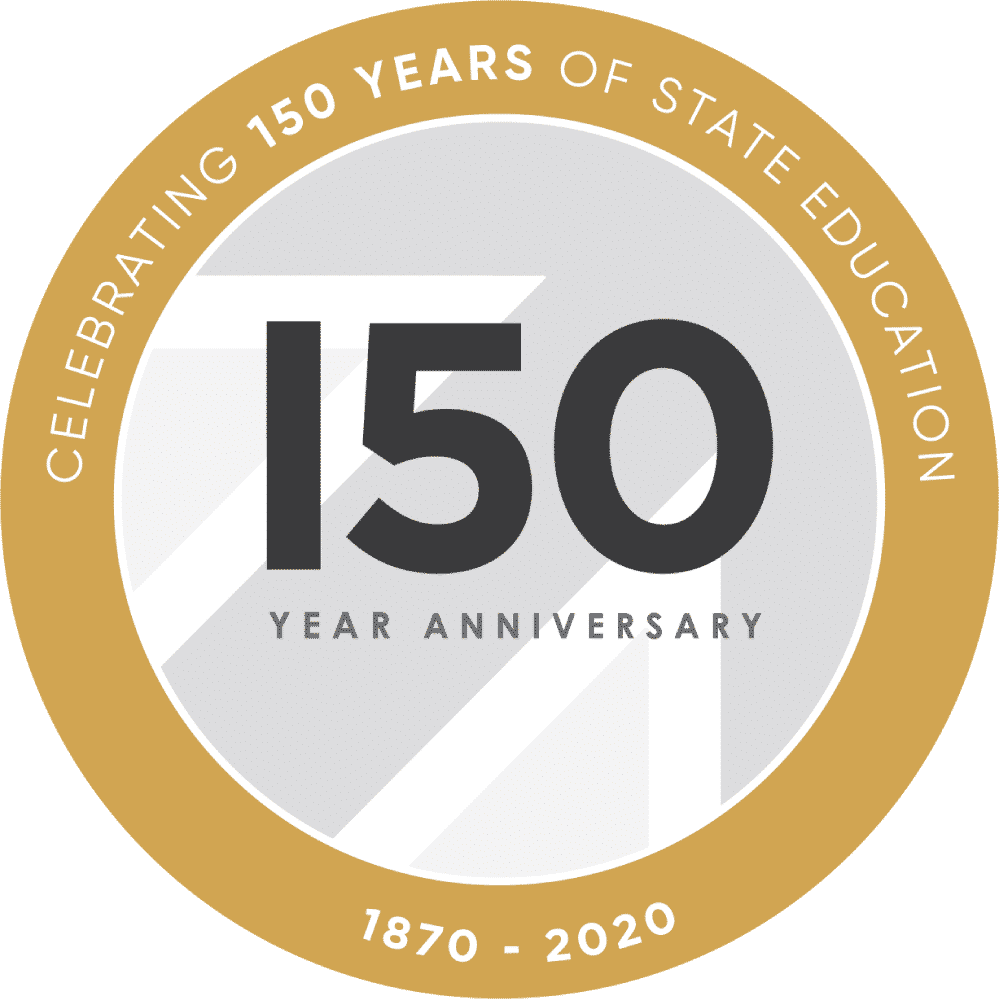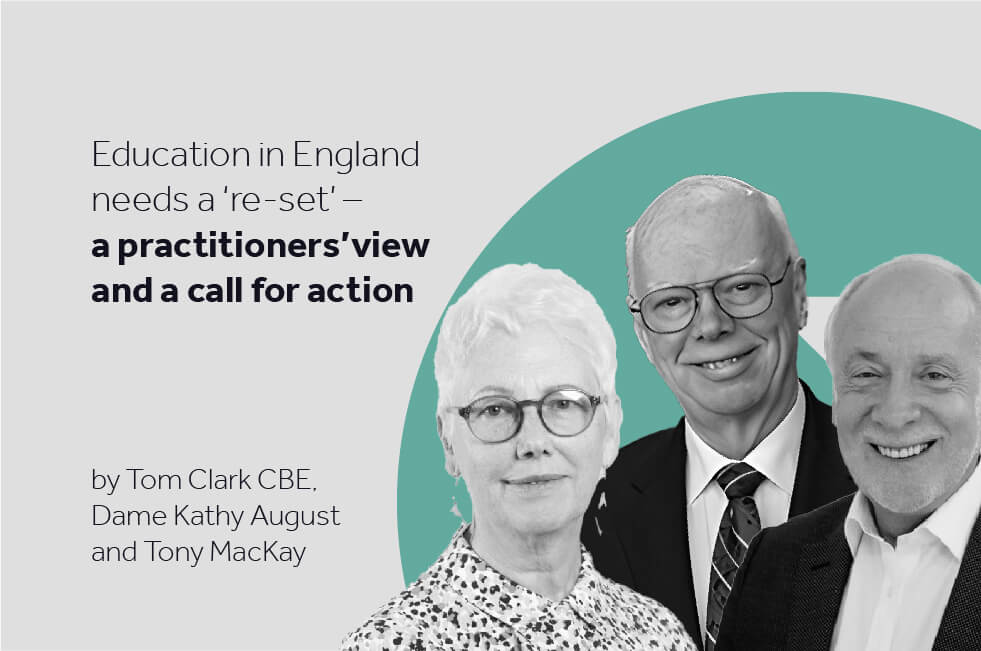The Foundation for Education Development (FED) are delighted to share this thinkpiece by Tom Clark CBE, Dame Kathy August and Tony Mackay (Centre for Strategic Education, Melbourne, Australia). On reading this they ask to consider the following – Please note we invite a bi-partisan approach. We want the core of good education policy to be jointly owned by Government, the profession, the stakeholders and the public – a cause for the common good.
Education in England needs a ‘re-set’ – a practitioners view and a call for action
In another 50 years’ time researchers of educational history will be hard pressed to decide which period of the last 50 years turned out to be the most productive in terms of translating political intent to an effective reality. Which will be the set of policies that the evidence shows succeeded or even approached England achieving a first class public education service?
The scope and reach of AI that until relatively recently seemed to be futurology is already beginning to be felt. A world class public education system needs to be informed by a strategic appreciation of the ways in which learners can benefit from new technologies and the impact they will have on their lives and their learning.
However, the current direction of travel in education seems counter- productive. The present route map is of a manufactured division of ‘traditional’ versus ‘progressive’ mindsets. Too often the status of ‘expert’ is awarded to those who have simply established themselves as education ‘influencers’ with strong political links but with little substantive evidence of impact. Theories are promoted without an appreciation of the need for effective implementation, and there is an increasing over reliance on ever stricter disciplines in order to make schooling accept a stale orthodoxy, a ‘groupthink’, which worryingly expects compliance whilst dismissing challenge.
There is an awareness of the large gaps in achievement, particularly for boys in disadvantaged areas; of a lack of trust in our leaders and law-makers; and the overwhelming fear and lack of agency felt by communities. Postpandemic recruitment and retention in education is severely compromised and there is evidence of school leaders choosing to retire early.
A ‘re-set’ is needed – one in which public education acknowledges present failings and the need for a new vision of the future. The backdrop to this is one of wider global societal change accelerated by the pandemic and the pace of technological advance. Geo-politically, in different parts of the world, traditional judgements are being challenged including those relating to capitalism, Western democratic values and authoritarianism with the risk of social fragmentation being very high.
Having worked in education at senior executive levels since the 1988 Education Act and been in the vanguard of change throughout the intervening period we believe a re-set of priorities is needed. As long-serving Headteachers, our work was recognised nationally but the culture then was much less risk-averse. Compliance was not an end in itself and Government and regulatory bodies, though ever-ready to tell Headteachers what to do, were much less likely to tell Headteachers how to do things. School leaders were the leading professionals. The landscape today is one where there has been a serious shift to the DfE of a controlling power which neither encourages nor enables the professional engagement of school leaders. This has to change as society has had to change in what may become a paradigm shift.
We want to encourage a view that re-imagining and re-setting the education system as a whole in England is necessary by developing, disseminating and advocating new thinking – the direction of travel for a ‘new age of education’ and we want to remind all stakeholders that they have the expertise and the capacity to help lead this process. This is a collective challenge which includes government, indeed releases government to enable and broker a ‘re-set’ rather than focusing on regulation. Any ‘re-set’ has to have a systematised design within which leaders can lead and needs an agreed long-term plan with a shared vision of education which includes business. A strong economy needs a strong education service.
Why now?
Education in England needs re-imagining because of years of increasingly chaotic government, the self-infliction of ‘grade inflation’, questionable changes, and likely disruption to teacher training and present funding issues which highlight that the system is simply not fit for purpose for young people and new societal demands. The system needs re-purposing and a new design.
The perpetual lag between education and the societal and technological changes affecting it has grown and it is now approaching a chasm. The policy response has been to double down on increasing centralisation and consequent direction. As a result children and young people in state education are becoming more and more disconnected. Meanwhile the economic costs of such alienation grow exponentially.
Change is needed not in structures but in terms of purpose, objectives and method. There has been an incoherent and inefficient waste of resources which has compromised future thinking and practice. It’s not just about the size of the resource – it’s about how it is used.
Too much of the thinking of the past has concentrated on the ‘what’ and the ‘how’ with too much focus on structures rather than remembering what education is for, the ‘why’, (the purpose) and what metrics we should use to value young people and their learning made more urgent in England by the recent ‘devaluation’ of the currency of qualifications.
However inconvenient, and despite the noise of the media and the distractions of social media, we must acknowledge that the culture of permanent ‘risk avoidance’ and routine ‘compliance’ to an Orwellian-like ‘group- speak’ of a new orthodoxy and its establishment of vested interests, is stifling professional initiative and creating homogenised learning. The effect of this rigidity is not recognised for what it is or does to undermine and dissipate the confidence of school leaders and other stakeholders. It strangles the very innovation and creativity which the country, the economy and the sector requires.
We already have a ‘one world economy’ of instant communications, internet learning, networks and virtual communities, with the accelerated flows associated with geopolitics, economics, communications and business, in an already fundamentally changing world. As globalization and rapid advancements in technology continue to transform civic space and the world of work, education systems have grown increasingly disconnected from the realities and needs of global economies and societies. Education models must adapt to prepare young people for personal growth, life and work in a global society by radically reconsidering its purpose, culture and operation. The digital age is already transforming the corporate world. Schools and Colleges have to catch up now. (World Economic Forum January 2020)
This 4th Industrial Revolution is causing a seismic shift in all aspects of life, where, in a cyber world of ‘AI’ and machine learning, we need to ‘protect’ a space for humans in which they can flourish. The future is not what it used to be – it is already here.
We are not the only voices
Of course there is widespread thinking and activity in the UK and abroad, in particular in Singapore, Hong Kong, British Columbia, and Estonia. We value the ‘work streams’ of the UK Foundation for Education Development, the report of The Times Education Commission, The OECD paper ‘Building the Future of Education’, statements from The Centre for Global Development and the United Nations each in consideration of the need to transform education. These initiatives have their own integrity but are rather piecemeal. However to meet a collective challenge we need to come together.
The challenge
We need to
1. Agree that pedagogy is the professional practice which ensures that the curriculum as intended is enacted and should lead the learning process. Structures should come later to enable the design not limit it
2. Challenge in real time the comfortable Westminster metropolitan belief of how education looks and works across all the regions of the UK
3. Widen the metrics by which we value young people beyond SATs, GCSE, and ‘A’ level recognising that changing the metrics changes the curriculum and ways of learning and that resourcefulness, independence of thought, communication skills, initiative, global citizenship, digital skills and entrepreneurship should be valued
4. Re-imagine Teacher Education and Training – its structure and content in order for teachers to become ‘experts’ in learning and pedagogy
5. Highlight that technology can be used to facilitate wider learning, different types of learning and more learning opportunities 24/7, 365 days a year, led by pedagogy which acknowledges a new ‘blend’ of face-to-face, virtual and collaborative learning such that the education service becomes more a process than a location. (Sadly, so far the use of on-line technology seems rather to have been used for administrative purposes rather than to enhance the learning experience, too much of on-line learning attempts to replicate but not develop classroom experience)
6. Re-imagine and re-value vocational and digital education helping eliminate the elite education ‘snobbery’ that undermines developing vocational skills and apprenticeships
7. Demand, expect and ensure transparency in the accountability of Universities and urge them to provide more flexible 2 year undergraduate courses with a mix of residential, face to face, and remote learning which doesn’t drain local communities of too many of their best and brightest who take up university residence but few of whom return home after graduation
8. Recognise that on balance in their work regulatory bodies like Ofsted should report rather than evaluate their findings
9. Underpin any changes by a forensic consideration of governance, finance and learning out comes in all education institutions.
How should things look?
Some of the desirable changes might see
1. Schools at the heart of public services with data sharing protocols processed through shared admin hubs. Access to all professionals being enabled via AI in real time through education channels but stopping the over reliance on the school system to provide social control. Schools make an important contribution but cannot underpin the whole of society
2. All the learning of students being valued Global learning resources developed and shared on line on-line
3. Curricula developed both ‘vertically’ for subjects for depth but also ‘horizontally’ for the development of skills
4. Teacher- pupil relationships reimagined emphasising a tutorial model for learning
5. Many school buildings which are too small and simply no longer fit for purpose are closed or linked virtually
6. Some retained or new buildings become local and regional state of the art hubs for science and technology, sport, the arts, and social interaction and development, open all day every day complementing the standard school provision of ‘subjects’ like history, english, and geography
7. Greater system leadership demonstrated by practitioners embracing the digital future
8. More focused and efficient use of resources Reduced student costs in fees and charges for residency
9. ‘Term’ times – an anachronism largely based on the 19th Century farming calendar are scrapped.
Better educated people and wealth creators in the global economy
The challenges are huge but not insurmountable and resolution is cultural as well as technical and political.
‘Civil society rests on moral relationships…. They are not brought about by government but by us’ (Jonathan Sachs) but we recognise only government can enable a ‘re-set’. To be enacted a collective challenge requires system-wide recognition and a collective responsibility to resolve issues seen as a public duty. The shape of education now and the future could benefit from Sydney Newman’s advice to ‘look back not in anger nor forward in fear but around with awareness’ to which we might add but with energy and resolve’.
Tom Clark, (Dame) Kathy August and Tony Mackay (Centre for Strategic Education, Melbourne, Australia)
Tom Clark, CBE, FRSA, Vice-Chair Academy Transformation Trust, was formerly CEO of George Spencer Foundation School and Technology College and Associate Director of the Specialist Schools and Academies Trust and FED Ambassador. His work internationally has included helping to develop school networks in Australia, the USA and Hong Kong. Having chaired FASNA and the Govnet Advisory Board, he now advises a number of multi-academy trusts and the Association of Education Advisers.
Dame Kathryn (Kathy) August has spent 45 years working in and for public education. She had three secondary headships and has also been a Director of Education in two LEAs, worked as a senior adviser in the DfE, been a visiting professor at Salford Business School and worked as an interim CEO. She became a Dame in the 2014 New Years honours list. Her book Becoming an Academy School in the UK: With Principal (Cambridge Scholastic publications) was published in June 2022.
(Please note we invite a bi-partisan approach. We want the core of good education policy to be jointly owned by Government, the profession, the stakeholders and the public – a cause for the common good).
With appreciation to our colleague Anthony Mackay, CSE Melbourne, for his advice & support.
Anthony Mackay is immediate past CEO and current Co-Chair of the Washington DC-based National Center on Education and the Economy and a FED Ambassador. He was Inaugural Chair, Australian Institute for Teaching and School Leadership (AITSL); Inaugural Deputy Chair of the Australian Curriculum, Assessment and Reporting Authority (ACARA); immediate past Chair Australian Council for Educational Research (ACER) and immediate past Deputy Chair of the Education Council New Zealand.
Anthony is Deputy Chancellor, Swinburne University, Melbourne, Australia; Honorary Senior Fellow of the Graduate School of Education at the University of Melbourne; and Visiting Professor to the International Centre for Educational Enhancement, University of Bolton, UK. He is Co-Chair of Learning Creates Australia. Anthony is co-founder of the Global Education Leaders’ Partnership (GELP), and Foundation Board Chair of the Innovation Unit Ltd, England; an Expert Advisor to OECD/CERI; and Consultant Advisor to Global Cities Education Network. He is also the Moderator of the Annual International Summit on the Teaching Profession; and Moderator of Ministerial Sessions and Key Debates at the Annual World Innovation Summit on Education (WISE).
(Please note we invite a bi-partisan approach. We want the core of good education policy to be jointly owned by Government, the profession, the stakeholders and the public – a cause for the common good).
With appreciation to our colleague Anthony Mackay, CSE Melbourne, for his advice & support.



